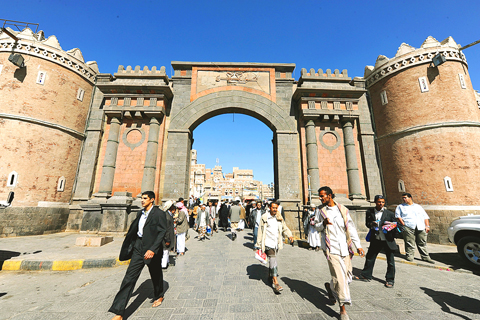As Yemen becomes the new front in the war on terror, its leaders want this to be clear: It does not intend to become another Iraq or Afghanistan with thousands of US troops on the ground.
Yemeni Foreign Minister Abu Bakr al-Qirbi drew some red lines on Wednesday in its burgeoning alliance with Washington against al-Qaeda, saying that Yemen welcomes US and foreign troops for training, intelligence and logistical support.
“But not in any other capacity,” he said, adding that “there is a lot of sensitivity” among Yemenis about foreign combat troops.

PHOTO: EPA
He underlined that Yemeni forces would remain under Yemeni command, without any joint authority with the Americans.
His comments came as Yemeni security forces carried out a hunt for Mohammed Ahmed al-Hanaq, the suspected leader of an al-Qaeda cell believed to be plotting attacks on the US embassy or other consulates in Yemen. While troops searched in the mountainous region of Arhab northeast of San‘a where he was hiding, officials were negotiating with local tribal sheiks, demanding al-Hanaq’s surrender.
Washington and San‘a are still feeling out how far they can go in their newly intensified partnership against al-Qaeda, whose fighters have dug roots into the mountains of the impoverished Arab nation and now, the administration of US President Barack Obama says, present a global threat.
Military personnel from the US and other Western countries are already on the ground helping train Yemeni counterterror units and exchanging intelligence, and Washington and the UK are ramping up aid, pouring in tens of millions of dollars to build up the security forces.
Yemen’s government has been weakened by wars, poverty and its own misrule and corruption. Central authority barely extends beyond the capital, and heavily armed tribes control large areas. Many tribes are bitter toward San‘a and some give refuge to al-Qaeda fighters.
The US says the group in Yemen, known as al-Qaeda in the Arabian Peninsula, trained and provided the explosive materials for the 23-year-old Nigerian accused of trying to blow up a US passenger jet heading to Detroit on Christmas Day. This week, the US and other Western countries temporarily closed their embassies in San‘a after threats of a terrorist attack surfaced. The move was criticized by al-Qirbi.

FORUM: The Solomon Islands’ move to bar Taiwan, the US and others from the Pacific Islands Forum has sparked criticism that Beijing’s influence was behind the decision Tuvaluan Prime Minister Feletei Teo said his country might pull out of the region’s top political meeting next month, after host nation Solomon Islands moved to block all external partners — including China, the US and Taiwan — from attending. The Pacific Islands Forum (PIF) leaders’ meeting is to be held in Honiara in September. On Thursday last week, Solomon Islands Prime Minister Jeremiah Manele told parliament that no dialogue partners would be invited to the annual gathering. Countries outside the Pacific, known as “dialogue partners,” have attended the forum since 1989, to work with Pacific leaders and contribute to discussions around

END OF AN ERA: The vote brings the curtain down on 20 years of socialist rule, which began in 2005 when Evo Morales, an indigenous coca farmer, was elected president A center-right senator and a right-wing former president are to advance to a run-off for Bolivia’s presidency after the first round of elections on Sunday, marking the end of two decades of leftist rule, preliminary official results showed. Bolivian Senator Rodrigo Paz was the surprise front-runner, with 32.15 percent of the vote cast in an election dominated by a deep economic crisis, results published by the electoral commission showed. He was followed by former Bolivian president Jorge “Tuto” Quiroga in second with 26.87 percent, according to results based on 92 percent of votes cast. Millionaire businessman Samuel Doria Medina, who had been tipped

Outside Havana, a combine belonging to a private Vietnamese company is harvesting rice, directly farming Cuban land — in a first — to help address acute food shortages in the country. The Cuban government has granted Agri VAM, a subsidiary of Vietnam’s Fujinuco Group, 1,000 hectares of arable land in Los Palacios, 118km west of the capital. Vietnam has advised Cuba on rice cultivation in the past, but this is the first time a private firm has done the farming itself. The government approved the move after a 52 percent plunge in overall agricultural production between 2018 and 2023, according to data

ELECTION DISTRACTION? When attention shifted away from the fight against the militants to politics, losses and setbacks in the battlefield increased, an analyst said Recent clashes in Somalia’s semi-autonomous Jubaland region are alarming experts, exposing cracks in the country’s federal system and creating an opening for militant group al-Shabaab to gain ground. Following years of conflict, Somalia is a loose federation of five semi-autonomous member states — Puntland, Jubaland, Galmudug, Hirshabelle and South West — that maintain often fractious relations with the central government in the capital, Mogadishu. However, ahead of elections next year, Somalia has sought to assert control over its member states, which security analysts said has created gaps for al-Shabaab infiltration. Last week, two Somalian soldiers were killed in clashes between pro-government forces and